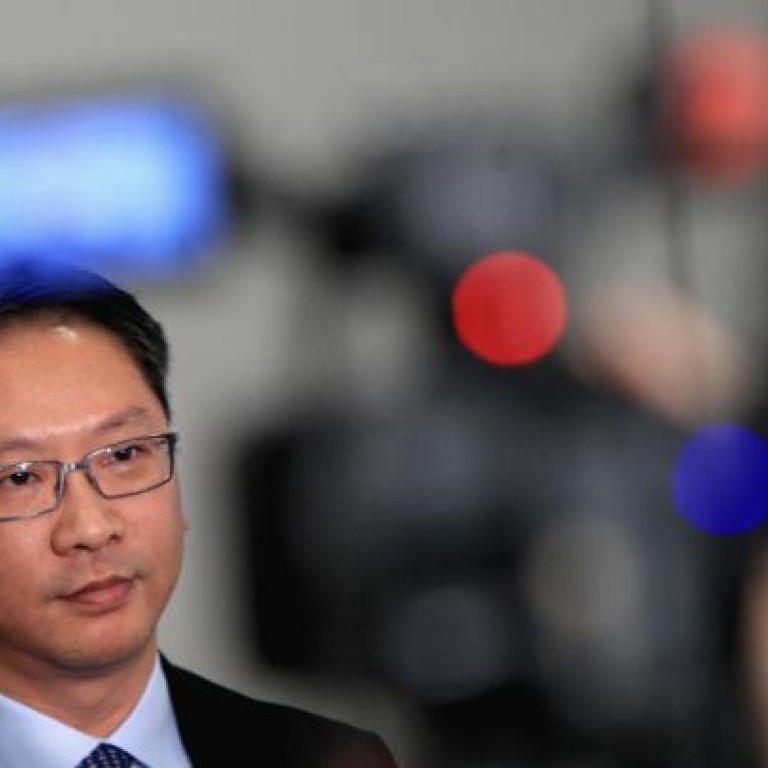
Hong Kong's judicial independence at risk, warn pan-democrats
Amend Basic Law to solve problem of mainland mothers, says lawmaker for the legal sector
The decision by the government to invite the Court of Final Appeal to refer the right of abode issue to Beijing has been condemned as a "very inappropriate" move that endangers judicial independence.
The criticism came from pan-democrats who insist the proper way to address the problem of mainland mothers giving birth in Hong Kong - thus gaining right of abode for their babies - is to amend the Basic Law.
The move, which could bring the fifth interpretation of the mini-constitution by the Standing Committee of the National People's Congress, was a surprise. Top officials, including Chief Executive Leung Chun-ying, have said repeatedly that seeking an interpretation by the NPC would be a last resort.
Secretary for Justice Rimsky Yuen Kwok-keung said yesterday that the decision followed a detailed study by Department of Justice staff. The government had also sought independent legal advice from senior counsel in Hong Kong and Queen's Counsel in the UK, he said.
A source close to the department said the move was seen as the most appropriate option at the moment. "But after all it is up to the court to decide."
Speaking at a Foreign Correspondents' Club lunch last week, Leung said seeking NPC interpretation was one route to "tidy up the legal end", but "we will try not to use this route."
Civic Party barrister-lawmaker Alan Leong Kah-kit said the decision was "a very bad move and very inappropriate".
"While I have confidence that the judges will be able to stand up to pressure, including political pressure, the secretary for justice is in fact challenging, or even endangering, judicial independence," he said.
Legal sector lawmaker Dennis Kwok Wing-hang said amending the Basic Law was the ultimate solution to the problem of mainland mothers.
People Power lawmaker Albert Chan Wai-yip said it was unacceptable for the administration to intervene in the judiciary.
Executive Council member Andrew Liao Cheung-sing, a barrister, said the standing committee's 1999 interpretation that denied permanent residency to children born outside the city before either parent was a permanent resident was not clear in its application to current legal moves by domestic helpers to qualify for abode. "It is appropriate for the department to request the Court of Final Appeal to seek clarification from the NPC standing committee," he said.
Lawmaker Tam Yiu-chung, chairman of the Beijing-loyalist Democratic Alliance for the Betterment and Progress of Hong Kong, echoed that view.
"The Preparatory Committee for HKSAR had clear definitions of permanent residents of Hong Kong," he said. But the ruling in 2001 that that Hong Kong-born mainland baby Chong Fung-yuen had right of abode, regardless of her parents' immigration status "did not consider the opinions of the committee".
KEY LEGAL RULINGS AND DECISIONS
Court of Final Appeal, in case of Ng Ka-ling v Director of Immigration, rules it is not necessary for a parent to be a Hong Kong permanent resident at the time of the birth of a child in order to enjoy right of abode. The ruling sparks fears of an influx of migrants. Secretary for security Regina Ip Lau Suk-yee says up to 1.67 million migrants could come to Hong Kong over 10 years.
Government seeks interpretation of Basic Law from Standing Committee of the National People's Congress (NPCSC), which makes clear that children born outside Hong Kong would be eligible for right of abode only if at least one parent had already acquired permanent residence status at the time of their birth. Hundreds of local lawyers protest in silent march. Court of Final Appeal rules, in case of Chong Fung-yuen v Director of Immigration, that mainland children born in Hong Kong before and after 1997 can enjoy right of abode.
Individual Visit Scheme introduced to allow mainland travellers to visit Hong Kong on an individual basis. Number of children born in Hong Kong to mainland mothers has since climbed steadily.
Chief executive-elect Leung Chun-ying announces "zero-quota" policy to stop mainlanders giving birth in public hospitals.
Secretary for Justice Rimsky Yuen Kwok-keung confirms government has suggested Court of Final Appeal seeks NPCSC interpretation of right of abode law for foreign domestic helpers.
